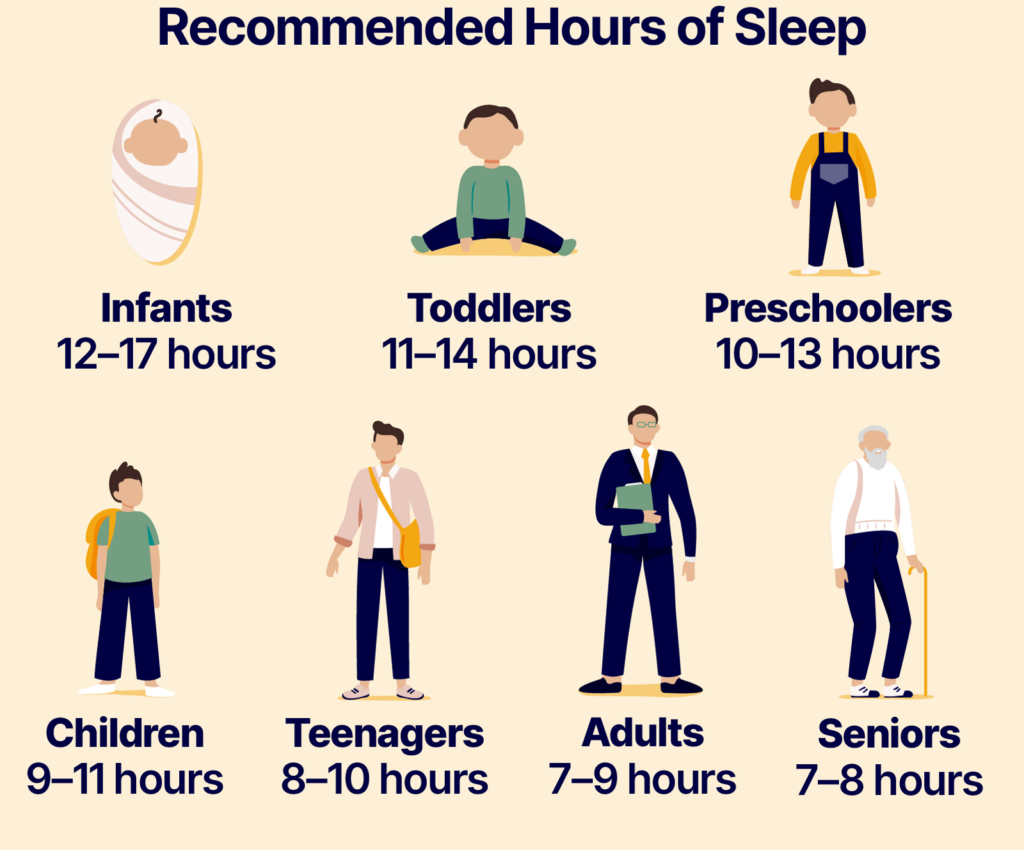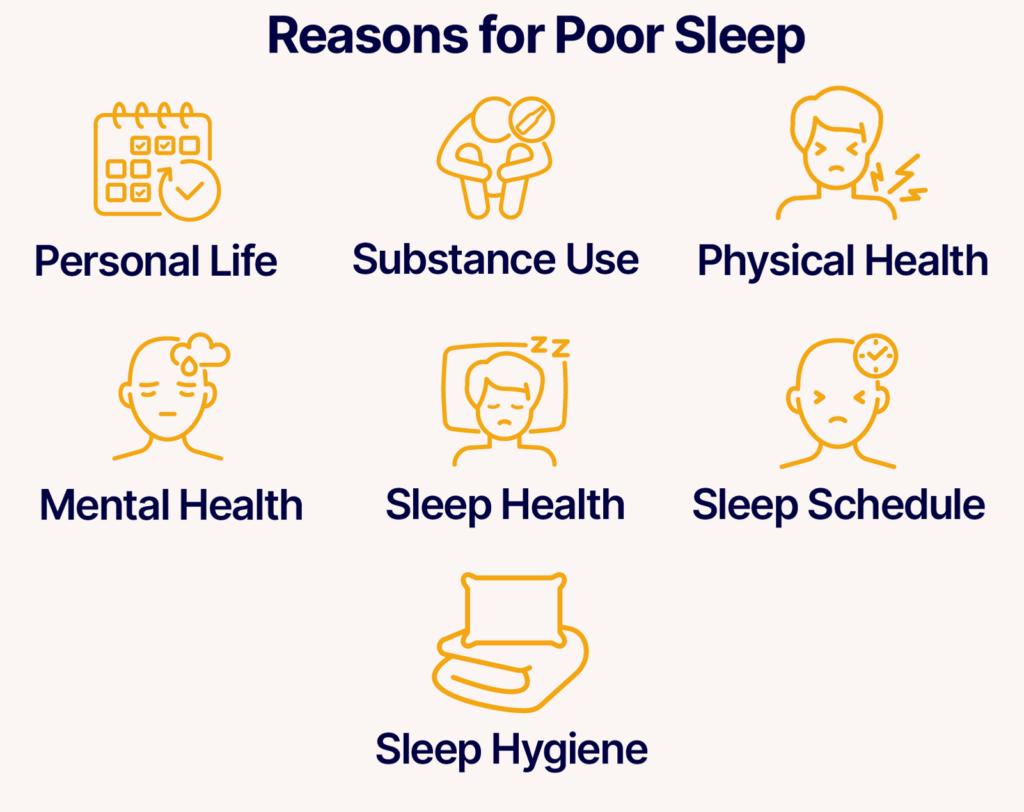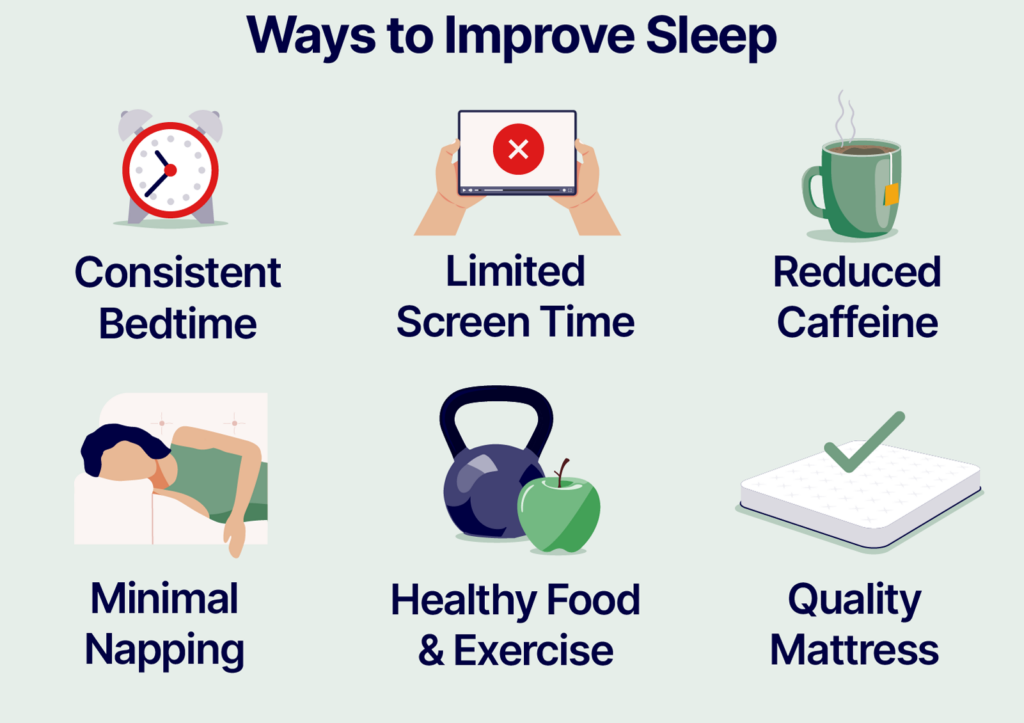Is 6 Hours of Sleep Enough? Find Out How Much Rest You Need
Updated: January 9, 2026 | Published: June 17, 2025Six hours of sleep isn’t enough for most adults. It’s true that some people can function with less sleep, but this is very rare. That means you likely need at least seven hours of sleep every night.
If you’re regularly getting less than seven hours of quality rest, you aren’t alone. Many adults struggle to find enough time in the day for all their responsibilities—and that time often comes out of their valuable sleep.
But the right quality and quantity of sleep is essential for your physical, mental, and emotional health. In this article, we’ll explore how much sleep you need and how to get a better night’s rest.
Disclaimer: We co-authored this article with certified sleep consultant Brooke Hohenadel. The following tips, including those from Brooke, are general recommendations and aren’t meant to replace your doctor’s professional diagnosis. Always consult your physician before making any changes to your personal healthcare.
How many hours of sleep do I need?
Most people need at least seven hours of sleep every night. That said, each person has different sleep needs, and those needs can change over time. You might find you need more or fewer hours of sleep depending on your lifestyle.
These are the recommended hours of sleep for each age group:
Age Group | Age Range | Hours of Sleep |
|---|---|---|
Infants | Under 1 year | 12–17 hours, including naps |
Toddlers | 1–2 years | 11–14 hours, including naps |
Preschoolers | 3–4 years | 10–13 hours, including naps |
Children | 5–13 years | 9–11 hours |
Teenagers | 14–17 years | 8–10 hours |
Adults | 18–64 years | 7–9 hours |
Seniors | 65+ years | 7–8 hours |
How many hours of sleep do women need?
Women aged 18–64 need 7–9 hours of sleep every night, while women over 65 should get 7–8 hours. But over 60% of women aren’t getting the recommended amount of sleep.
This could be partly due to the mental load or the work that goes into running a household and is often managed by women. Women are more than three times more likely to interrupt their sleep for caregiving than men.
(That said, we know that men can lose sleep to the mental load, too!)
How many hours of sleep do men need?
Men aged 18–25 should get 7–9 hours of sleep each night. Less than 6 hours for this age range isn’t enough, while 11 hours or more would be considered oversleeping.
Men aged 26–64 should also aim for 7–9 hours of sleep, but at this age, 10+ hours starts to be considered oversleeping. Men over 65 years of age need 7–8 hours of sleep on average, with a minimum of 5 and a maximum recommendation of 9 hours.
According to this study, employment status can significantly affect the average amount of sleep a man gets. Men are also more likely to go to bed between midnight and 4 a.m. than women.
On average, men typically get about 11–13 minutes less sleep than women, apart from recovery days like a weekend or a day off from work. This could be because men are slightly more likely to have full- or part-time jobs than women.
How many hours of sleep do children need?
Newborn babies under 1 year old have the longest recommended sleep time at 12–17 hours a day, including naps. As children get older, they need less sleep. Here are the recommended sleeping hours for children in different age groups:
- Toddlers (1–2 years): 11–14 hours
- Preschoolers (3–4 years): 10–13 hours
- Children (6–13 years): 9–11 hours
- Pre-School (3-5 years) 10-13 hours
- Teenagers (14–17 years): 8–10 hours

Am I getting quality sleep?
Quality sleep can mean the difference between waking up rested or feeling exhausted. Even if you’re sleeping an appropriate amount for your age and needs, a lack of quality sleep can make you feel irritable, reduce your cognitive ability, and even lead to long-term physiological problems.
Your sleep quality can be attributed to several factors, but it’s notably tied to the amount of deep sleep you get each night. Deep sleep is the third phase of your sleep cycle.
In this phase, your body can fully relax your muscles, repair tissues, strengthen your immune system, and restore your energy for the next day. Adults should spend about 25% of their night in this deep sleep phase to feel rested.
If you consistently wake up feeling unrested or oversleeping to achieve a feeling of rest, you may be suffering from a health or sleep condition. Consult your doctor about your sleep patterns to help ensure your long-term health.
What is sleep debt?
Sleep debt is the amount of time your body has missed out on sleep. This time accumulates night over night and can impact how rested you feel. For example, if you need 8 hours of sleep a night but only get 7 hours for 3 nights in a row, you’ve accumulated 3 hours (1 hour x 3 nights) of sleep debt.
A study shows that it can take four or more days to fully recover from just 1 hour of sleep debt. But getting just one night of catch-up sleep can help your body’s functions improve greatly, like cognitive behavioural performance, and help you get back on track. It’s never too late to start getting enough sleep.
Brooke’s Tip: |
|---|
Try moving your bedtime earlier after a night or two of poor sleep. Even a 30-minute shift can make a big difference in how you feel the next day. |
How do I track my sleep quality?
You can track sleep quality in several ways. If you’re getting your sleep evaluated and tracked professionally, you may know about an objective tool like polysomnography. However, this isn’t an affordable or highly accessible method.
As a result, subjective sleep quality tests are a more straightforward and more cost-effective way to evaluate sleep quality, like the Jenkins Sleep Scale, the Leeds Sleep Evaluation Questionnaire, and the Athens Insomnia Scale. In cases of insomnia, Dr. Charles Morin’s framework is also commonly used. It highlights how the perceived severity of insomnia is often greater than what clinical assessment shows. This realization can be reassuring and may help individuals feel more empowered to take steps toward improving their sleep.
There are also some ways for you to track your sleep by yourself and at home. Different tools and devices monitor your heart rate, breathing rate, movement, time in each sleep cycle, and other elements to help track your sleep.
Popular ways to track sleep quality include sleep diaries, smartwatches, health rings, sleep mats, and smartphone apps. While the jury is still out on the accuracy of sleep tracking devices, they can give you a glimpse into your sleep quantity and quality.
That said, sleep trackers may not be ideal for everyone. For some, focusing too much on the data can affect how they perceive their sleep, sometimes leading to unnecessary worry. Our sleep consultant, Brooke and other experts recommend using these tools as a supplement and relying on your body to tune into how you actually feel when you wake up.
READ MORE: Should you buy Eight Sleep?
Why aren’t I getting enough sleep?
Many factors can influence the amount and the quality of sleep you’re able to get each night. Some common factors for sleep loss include:
- Personal life: Spending time with loved ones, dealing with personal matters, or caring for children can mean staying up later than you’d like, or having your sleep interrupted throughout the night. While many of these tasks are positive, the effects on your sleep can be negative.
- Substance use: Substances like alcohol, drugs, and certain medications can disrupt your body’s natural sleep rhythms and make it harder to fall asleep. Even everyone’s favourite substance, coffee, can keep you awake much longer than intended. Our sleep consultant recommends avoiding caffeine after 2 p.m., as studies suggest it may reduce the amount of deep, slow-wave and REM sleep, even if you fall asleep easily. Cutting back in the afternoon and evening might help you get more restful sleep.
- Physical health: Being sick or in pain can make it harder to fall asleep and stay sleeping. Pain can come from existing injuries or chronic illnesses, but it can even be created or worsened by sleeping on the wrong mattress. (Read our free guide on how to choose a mattress.)
- Mental health: Mental health issues such as anxiety, depression, grief, and stress can be linked to a lack of sleep quantity or quality. Dealing with these issues can decrease the amount of sleep you get. Inversely, suffering from a lack of sleep can also lead to the development of mental health issues. Our sleep consultant, Brooke, often calls REM sleep the brain’s “best therapist” because of the key role it plays in processing emotions and supporting mental recovery.
- Sleep health: Individuals suffering from sleep-related disorders like sleep apnea, restless leg syndrome, or insomnia often struggle to fall asleep or don’t experience restful sleep.
- Sleep schedule: Disruptions from your regular sleep schedule can compound and build up over time, making it harder to fall asleep. It’s also important to pay attention to your circadian rhythm. For example, if you’re a night owl who has to wake up early, you might find it hard to get enough sleep.
- Sleep hygiene: Not practicing proper sleep habits like having a consistent bedtime routine or having a clean, comfortable environment to unwind in can affect your ability to get restful sleep. Other factors, like using electronics directly before bed, can also interrupt your body’s release of melatonin and make falling asleep more difficult.

What happens if I don’t get enough sleep?
Being tired is a feeling that many people know too well. Missing out on a couple nights of sleep can make you feel sleepy and sluggish. But with time, sleep deprivation can lead to serious neurological and physiological issues that can impact your well-being. That’s why getting a good night’s sleep is so essential.
Drowsiness and cognitive impairment
Our brains need restful sleep to function properly. Without enough rest, you may struggle to concentrate, make decisions, or think critically. Lowered mental capacity can impact your performance at work or school, which in turn has its own consequences.
There is also a strong link between sleep deprivation and car accidents. Some sources suggest that every hour, one person in the United States dies in a traffic accident as a result of fatigue-induced errors (Walker, 2017).
Lowered cognitive function can affect your ability to drive safely and stay awake behind the wheel. That means that missing out on sleep could put yourself and others at risk while you’re on the road.
Physical health issues and increased risk of disease
Regularly getting less than six hours a night weakens your immune system, can increase the risk of developing Alzheimer’s, disrupts blood sugar levels, increases the risk of coronary artery disease, and contributes to psychiatric conditions. You may also want to eat more, meaning you might notice weight gain (Walker, 2017).
A consistent lack of sleep can also lead to an increased risk of physical issues such as:
- High blood pressure
- Heart attack
- Heart disease
- Stroke
- Diabetes
- Hypertension
- Kidney disease and metabolic syndrome
Mental health and relationship issues
While sleep issues are often defined as a result of mental health issues, research also shows that insufficient sleep can increase the risk of developing depression, anxiety, or other cognitive conditions.
Our resident sleep consultant says that during REM sleep, the brain processes emotions, consolidates memories, and helps reduce the intensity of negative feelings, supporting overall mental well-being.
Sleep deprivation can also affect your ability to regulate your emotions, leading to possible irritability and mood swings.
How do I sleep better?
According to the Government of Canada, “1 in 2 adults have trouble going to sleep or staying asleep, 1 in 5 adults do not find their sleep refreshing, and 1 in 3 adults have difficulty staying awake during waking hours.”
This suggests that, even though we know how important sleep is, it’s still hard to get a restful night of sleep. And getting a good night’s sleep starts with being able to fall asleep in the first place.
Here are some ways you can set yourself up to achieve 4–6 cycles a night for great sleep:
- Establish a consistent bedtime. Having a consistent nighttime routine, including wind-down time and a similar bedtime each night, is good for your body. The more your body is used to falling asleep at a certain time, the easier it is. Plus, knowing what helps you get relaxed before bed—like having a cup of non-caffeinated tea or reading a book—can help you unwind from the stress of the day and get into a sleepy mindset.
- Limit your screen time. Blue light interrupts the release of melatonin in your body, which means you may have more trouble falling asleep if you’re looking at devices right before bed. Limiting screen time for 30–60 minutes before bed can help your body start to get sleepy. Leaving your phone or device in another room can help—no more checking emails or watching “one more episode” of your favourite TV show. What you watch, read, or scroll through before bed can affect how easily you fall—and stay—asleep. Content that’s stressful, emotional, or overly stimulating can make it harder for your brain to wind down.
- Reduce caffeine intake. Caffeine’s half-life is around 5–6 hours. It can take 10 hours or longer for it to be fully out of your system. To avoid difficulties falling or staying asleep, try to limit any coffee, tea, or energy drinks in the late afternoon, and especially in the evening. Alcohol can also disrupt your sleep schedule, so try to limit its intake before bed.
- Take minimal naps. Some days we just need a nap, and that’s perfectly okay. However, napping for too long throughout the day or too close to bedtime can make it difficult to fall asleep when you’re ready. It can also make you wake up earlier than you need to.
- Prioritize healthy food and exercise. Tiring out your body is a great way to help it fall asleep. Because working out elevates your heart rate, try not to exercise too close to bedtime. You can also support your healthy habits by eating a balanced diet. Eating lots of foods high in sugar can stimulate brain activity and make it difficult to fall asleep.
- Invest in a quality mattress. Pain and discomfort at night can lead to restless sleep. Finding a mattress that fits your sleep needs can help improve your sleep quality and quantity. Try a mattress like Octave, which is designed to promote restful sleep and help you wake up feeling refreshed.
Brooke’s Tip: |
|---|
Using sleep mantras like “I am asleep” can help the mind let go, especially when the body is already resting but the brain hasn’t caught up. |

What are the different stages of the sleep cycle?
Once we fall asleep, we’re in the first non-REM (non-rapid eye movement) phase of our sleep cycle. After that, our body moves from light to deep sleep. The end of our sleep cycle is REM (rapid eye movement) sleep, which is where we dream.
Here’s roughly how much time we spend in each sleep cycle:
- Phase 1 (NREM) (N1): Very light sleep where the muscles in the body are still not fully relaxed. This stage typically lasts roughly 1–5 minutes per cycle.
- Phase 2 (NREM) (N2): A deeper sleep where your body temperature and heart rate drop. We spend 45% of our sleep in this phase. It lasts around 10–25 minutes in our first cycle and becomes longer throughout the night.
- Phase 3 (NREM) (N3, slow-wave sleep): Our deepest phase of sleep. This phase is restorative for your body and helps you wake up feeling rested. We spend about 25% of our night in deep sleep, with the first cycle being the longest, and shortening throughout the night. You’re most likely to experience grogginess, or sleep inertia, for 30–60 minutes after being woken up in an N3 phase.
- Phase 4 (REM): REM, or rapid eye movement, is the sleep phase where our muscles become temporarily paralyzed and we may experience vivid dreams. Another 25% of our night is spent here. The first REM cycle of the night will last around 10 minutes, while our last one of the night may last up to an hour. This is not considered restful sleep, and we’re more likely to wake up during this sleep phase.
Brooke’s Tip: |
|---|
Consider naps under 20 minutes to preserve nighttime rest and 90 minutes to reach a full REM cycle. |
Each sleep cycle lasts around 90 minutes on average. Being woken up during a deep sleep phase is much more challenging than in a light phase or REM, so timing your night based on a desired number of sleep cycles can be a good way of helping you actually wake up to your alarm in the morning.
The ideal number of sleep cycles is 4–6 per night. You can use a sleep calculator to help determine when you should go to bed or wake up based on how many sleep cycles you want.
When should I go to bed?
Ideally, you should go to bed at a time that will allow you to wake up at the end of a sleep cycle. Each sleep cycle lasts roughly 90 minutes, and it’s recommended to get between 4–6 sleep cycles each night.
Brooke’s Tip: |
|---|
Aim for 7.5 to 9 hours each night, with an 8-hour sleep schedule as a helpful standard. Bedtimes after 1:45 a.m. can also cut into the deep sleep that typically happens earlier in the night. |
Ideal resting and waking times
Here are a few examples of common waking times, with recommended bedtimes based on how many sleep cycles you need. We’ve included a 6-hour sleep period because a few people can function with this amount, but it’s not recommended.
Ideal Waking Time | Ideal Bedtime (9 hours, 6 sleep cycles + 15 minutes to fall asleep) | Ideal Bedtime (7.5 hours, 5 sleep cycles + 15 minutes to fall asleep) | Ideal Bedtime (6 hours, 4 sleep cycles + 15 minutes to fall asleep) |
|---|---|---|---|
6 am | 8:45 pm | 10:15 pm | 11:45 pm |
6:30 am | 9:15 pm | 10:45 pm | 12: 15 am |
7 am | 9:45 pm | 11:15 pm | 12:45 am |
7:30 am | 10:15 am | 11:45 am | 1:15 am |
8 am | 10:45 pm | 12:15 am | 1:45 am |
Based on your schedule and your ideal amount of sleep, your preferred bedtime and waking time can vary greatly from someone else’s. You can personalize your sleep times using tools like Octave’s Sleep Calculator.
You may not stick perfectly to your ideal bedtime every night, and that’s okay. The more you give yourself the tools and the routine to achieve quality rest, the easier it will become and the better your sleep will be.
When it comes to getting a restful night of sleep, 6 hours isn’t enough for the average adult. Prioritizing your sleep health and quality can mean better outcomes for your mental and physical well-being.
If you have concerns about your sleep duration or quality, be sure to consult a professional who can provide tools and other suggestions for improving your sleep.
Feel like your mattress is hindering your ability to get a good night’s sleep? Octave mattresses are designed with sleep wellness in mind, offering advanced cooling features for added comfort and ergonomic zoned support to promote proper spinal alignment.
References:
- Government of Canada, Statistics Canada. (2022, March 16). Sleep behaviours among Canadian adults: Findings from the 2020 Canadian Community Health Survey healthy living rapid response module. https://www150.statcan.gc.ca/n1/pub/82-003-x/2022003/article/00001-eng.htm
- 24-Hour movement guidelines – Canadian 24-Hour movement guidelines. (n.d.). https://csepguidelines.ca/
- Harvard Health. (2016, July 19). Women and sleep: 5 simple steps to a better night’s rest. https://www.health.harvard.edu/womens-health/women-and-sleep-one-simple-step-to-a-longer-healthier-life#:~:text=For%20optimum%20health%20and%20function,that%20may%20require%20medical%20attention.
- Mental load: What it is and how to manage it. (2024, January 8). UCLA Health. https://www.uclahealth.org/news/article/mental-load-what-it-and-how-manage-it
- Drake, C., Roehrs, T., Shambroom, J., & Roth, T. (2013). Caffeine Effects on Sleep Taken 0, 3, or 6 Hours before Going to Bed. Journal of Clinical Sleep Medicine, 09(11), 1195–1200. https://doi.org/10.5664/jcsm.3170
- Chennaoui, M., Arnal, P. J., Sauvet, F., & Léger, D. (2015). Sleep and exercise: A reciprocal issue? Sleep Medicine Reviews, 20, 59–72. https://doi.org/10.1016/j.smrv.2014.06.008
- Thensf. (2024, August 30). How much sleep do you really need? National Sleep Foundation. https://www.thensf.org/how-many-hours-of-sleep-do-you-really-need/
- Professional, C. C. M. (2025, February 11). Sleep. Cleveland Clinic. https://my.clevelandclinic.org/health/body/12148-sleep-basics
- Kitamura, S., Katayose, Y., Nakazaki, K., Motomura, Y., Oba, K., Katsunuma, R., Terasawa, Y., Enomoto, M., Moriguchi, Y., Hida, A., & Mishima, K. (2016). Estimating individual optimal sleep duration and potential sleep debt. Scientific Reports, 6(1). https://doi.org/10.1038/srep35812
- Vitale, K. C., Owens, R., Hopkins, S. R., & Malhotra, A. (2019). Sleep hygiene for optimizing recovery in athletes: Review and recommendations. International Journal of Sports Medicine, 40(8), 535–543. https://doi.org/10.1055/a-0905-3103
- Polysomnography (sleep study) – Mayo Clinic. (n.d.). https://www.mayoclinic.org/tests-procedures/polysomnography/about/pac-20394877
- Irish, L. A., Kline, C. E., Gunn, H. E., Buysse, D. J., & Hall, M. H. (2015). The role of sleep hygiene in promoting public health: A review of empirical evidence. Sleep Medicine Reviews, 22, 23–36. https://doi.org/10.1016/j.smrv.2014.10.001
- Walker, M. (2017). Why we sleep: Unlocking the Power of Sleep and Dreams. Simon and Schuster.
- Banks, S., & Dinges, D. F. (2007). Behavioral and physiological consequences of sleep restriction. Journal of Clinical Sleep Medicine, 3(5), 519–528. https://www.ncbi.nlm.nih.gov/pmc/articles/PMC1978335/
- Krystal, A. D. (2012). Psychiatric disorders and sleep. Neurologic Clinics, 30(4), 1389–1413. https://doi.org/10.1016/j.ncl.2012.08.018
- Public Health Agency of Canada. (2019, March 14). Are Canadian adults getting enough sleep? [Infographic]. Government of Canada. https://www.canada.ca/en/public-health/services/publications/healthy-living/canadian-adults-getting-enough-sleep-infographic.html
- Alahmary, S. A., Alduhaylib, S. A., Alkawii, H. A., Olwani, M. M., Shablan, R. A., Ayoub, H. M., Purayidathil, T. S., Abuzaid, O. I., & Khattab, R. Y. (2019). Relationship Between Added Sugar Intake and Sleep Quality Among University Students: A Cross-sectional Study. American Journal of Lifestyle Medicine, 16(1), 122–129. https://doi.org/10.1177/1559827619870476
- Patel, A. K., Reddy, V., Shumway, K. R., & Araujo, J. F. (2024, January 26). Physiology, sleep stages. StatPearls – NCBI Bookshelf. https://www.ncbi.nlm.nih.gov/books/NBK526132/#
